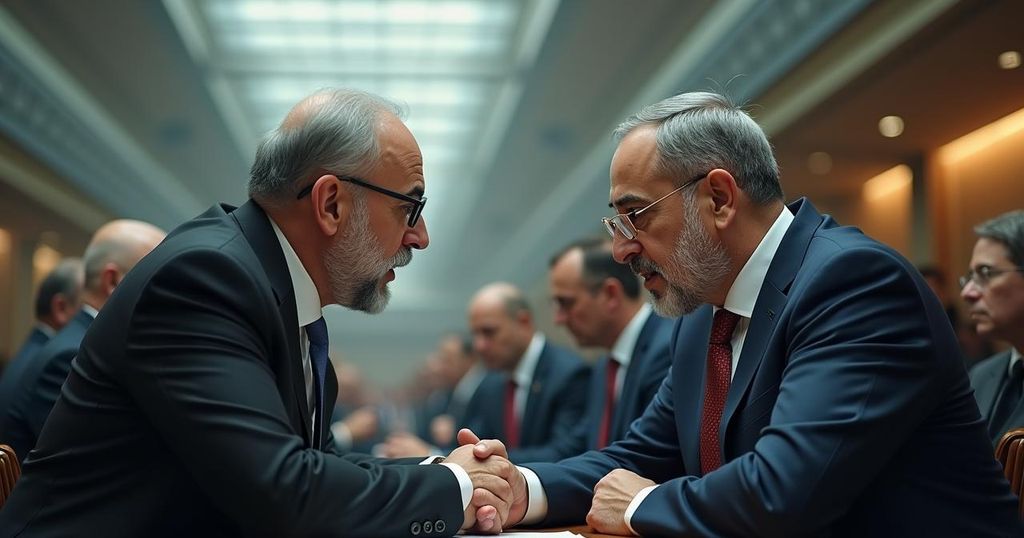Escalating Hostilities in the Iran-Israel Conflict: Recent Developments and International Reactions

Recent Israeli airstrikes in Beirut resulted in 22 fatalities and numerous injuries while targeting Hezbollah operations. Tensions with UN peacekeepers escalated, leading to international calls for a cease-fire from the United States and France. Concurrently, a significant investigation into IRGC Chief Esmail Qaani’s alleged espionage is underway amid ongoing conflict in Gaza and Lebanon.
In a series of airstrikes on Thursday, the Israeli military targeted Hezbollah operations in Beirut, resulting in the deaths of 22 individuals and injuries to 117 others, according to reports from the Associated Press. The strikes aimed to eliminate Wafiq Safa, a high-ranking Hezbollah official; however, he was not present at the time of the bombing, which completely destroyed the targeted buildings. In addition to the attacks in Beirut, the Israeli forces also launched artillery fire at the United Nations peacekeeping headquarters located in Naqoura, injuring two peacekeepers who subsequently required hospitalization. Tensions have escalated between Israeli forces and UNIFIL, the United Nations Interim Force in Lebanon, following a ground invasion initiated by Israel on October 1, which was met with resistance from UN troops. This latest military offensive has provoked international condemnation, with the United States advocating for a cessation of hostilities to avert a broader conflict involving Iran, Lebanon, and Israel. The Lebanese Ambassador to the UN has also requested an immediate cease-fire, while Israel’s envoy reaffirmed their military campaigns would continue until all Hezbollah operations are dismantled. Since the onset of heightened hostilities on October 7, 2023, over 2,000 people in Lebanon have lost their lives, and millions have been displaced, as reported by Lebanon’s crisis response unit. The Lebanese Health Ministry has indicated that approximately 10,212 individuals have sustained injuries during this prolonged Israeli offensive. Concurrently, similar military actions have unfolded in Gaza, where Israeli forces continue targeting militant sites, resulting in fatalities and injuries amongst civilians, including a recent attack on a school sheltering displaced families that claimed at least 27 lives. In light of these developments, both the United States and France have expressed their support for strengthening the Lebanese armed forces as a means to maintain peace along the border with Israel. U.S. Deputy Ambassador to the UN, Robert Wood, underscored the necessity for a robust and sovereign Lebanon, safeguarded by a legitimate military institution, namely the Lebanese Armed Forces. U.S. Vice President Kamala Harris reiterated the call for de-escalation in the Middle East, emphasizing the urgent need for a cease-fire amidst escalating hostilities in Gaza and Lebanon. Prior negotiations for a cease-fire, facilitated by the U.S. government, ultimately faltered due to ongoing violence between Israeli and Iranian forces. Furthermore, following the recent deaths of prominent Hezbollah leaders, Brigadier Esmail Qaani, head of the Islamic Revolutionary Guard Corps (IRGC), has been placed under investigation for allegedly being an Israeli informant. He has reportedly not been seen following the fatalities of significant figures within Hezbollah and is undergoing questioning while under house arrest. The ongoing Israeli military actions, particularly the airstrikes in Beirut and the attacks on UN personnel, illustrate a critical phase in the longstanding conflict between Israel and Hezbollah, amid escalating tensions across the region.
The Iran-Israel conflict is a complex and multifaceted geopolitical struggle that has intensified over the years, impacting regional stability and international relations. Recent events have escalated tensions further, particularly with the ongoing confrontation involving Israel, Hezbollah in Lebanon, and Iranian interests in the region. The actions of the Israeli military have drawn significant attention and international concern, especially with the involvement of UN peacekeeping forces and the humanitarian crisis unfolding in Lebanon and Gaza.
In summary, the current state of the Iran-Israel conflict reflects a significant escalation in military hostilities, primarily directed at Hezbollah and its leadership. The Israeli strikes in Beirut have caused considerable civilian casualties and have been met with widespread international condemnation. Calls for a cease-fire from various nations highlight the urgent need for de-escalation in the region, while investigations into potential treachery within the Iranian military add a further layer of complexity to this ongoing struggle. The situation continues to evolve, with the implications of these recent developments resonating across the Middle East and beyond.
Original Source: www.hindustantimes.com








